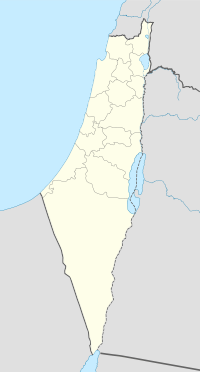Summil
| Summil | |
|---|---|
| Arabic | صميل |
| Name meaning | "Hard and withered" |
| Also spelled | Summeil |
| Subdistrict | Gaza |
| Coordinates | 31°39′56″N 34°47′43″E / 31.66556°N 34.79528°ECoordinates: 31°39′56″N 34°47′43″E / 31.66556°N 34.79528°E |
| Palestine grid | 130/119 |
| Population | 950 (1945) |
| Area | 19,304 dunams 19.3 km² |
| Date of depopulation | mid-July, 1948 |
| Cause(s) of depopulation | Military assault by Yishuv forces |
| Current localities | Kedma,Sgula,Menuha,Nahala,Vardon |
Summil (Arabic: صميل) was a Palestinian Arab village in the Gaza Subdistrict, located 36 kilometers (22 mi) northeast of Gaza. It was situated on a sandy hill in the coastal plain and had a population of 950 in 1945. It was depopulated during the 1948 Arab-Israeli War.
Summil was founded in 1168 during the Crusades by the Hospitallers for the purpose of protecting the fortress in Bayt Jibrin. Local tradition claims it was named after Samuel, one of the Crusaders who established the village. Under Mamluk rule in the 13th-15th centuries, it was referred to as Barakat al-Khalil ("the blessing of Abraham"), because its tax revenues were used by the sultan Barquq to endow the Ibrahimi Mosque in Hebron.
It was incorporated into the Ottoman Empire in 1517 with all of Palestine, and by 1596 it was part of nahiya (subdistrict) of Gaza under the liwa' (district) of Gaza. With a population of 363, it paid taxes on wheat, barley, fruit, beehives, and goats.
When Edward Robinson visited Summil in the 1838, he noted that it was a "considerable village on an elevation of the plain." He noticed a public well over 100 feet (30 m) deep and 11 feet (3.4 m) in diameter. He said that there was a "portion of an ancient wall apparently once belonging to a castle."
...
Wikipedia

